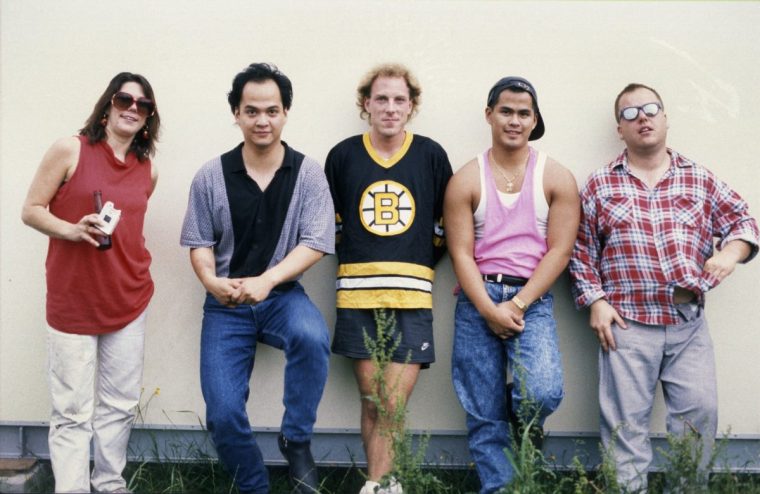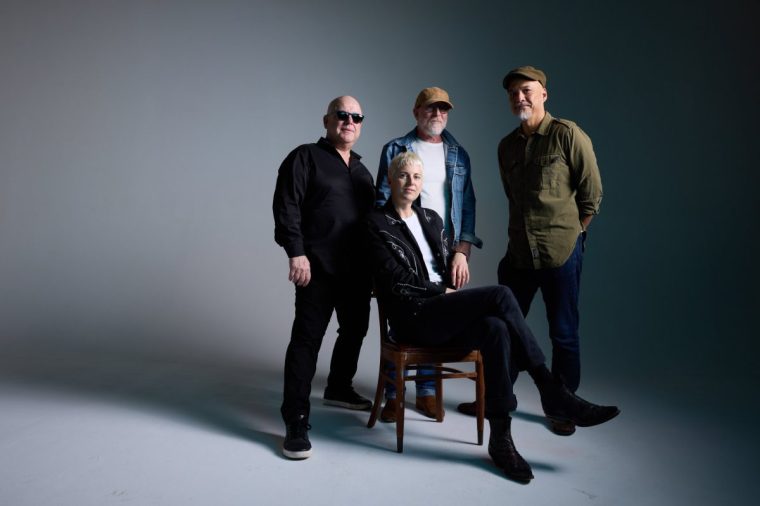Pixies frontman Charles Thompson IV, aka Black Francis, is in such garrulous form – lengthy answers, eccentric asides, animated gesticulations – he’s been talking about dead chickens uninterrupted for the past 12 minutes. Or at least that’s the general gist of it: I’d asked him about a new Pixies song called “Chicken”, in which a poor foul has its head decapitated.
On video call one morning in his dressing gown, Thompson says he’d been thinking of the phrase “running around like a chicken with his head cut off”. He’d recently had the realisation that “Where is My Mind?” – the title of the alt-rock legends’ most famous song, the archetypical example of Pixies’ groundbreaking late-80s loud-quiet-loud dynamics that was used to spectacular effect in the closing scene of Fight Club – was already an expression, and not one he’d made up himself. “Of course it is, but I never put two and two together. I’ve been so disconnected from the phrase. So it got me thinking about common expressions.”

Why chickens? During the pandemic, Thompson bought some for his back garden, set up a coop with an automatic door that opened with the sunlight, and tried to look after them.
It didn’t work out: they were systematically killed by a local fox who became Thompson’s nemesis. “I was smoking a spliff at six o’clock in the morning at my window, watching and waiting for the doors to open. But I was like, ‘F**king hell, man, there he is. He’s got the last chicken.’”
So he wrote “a horror moment, something a little bit squeamish thinking about the poor chicken with the blood squirting everywhere”. But really, he says, “it’s the guillotine effect. We think of those poor saps in the French Revolution with their head cut off – after the blade goes through their neck, is the head still aware? It’s such a head trip. No pun intended.”
Back to the song. “When I got to verse two, I’d had enough of chickens. And I immediately went to zombie.” Cue a second verse that’s a zombie apocalypse survival love story. “The poor guy is like ‘I love Mary Sue! She’s so beautiful!’
But even though everyone is dead or zombies, it doesn’t work out. And really the punchline of the song is how one person is treating another person, presumably in a romantic context.” You don’t get this from Chris Martin.
The surreal and the absurd have always been part of Pixies’ unique DNA. Their initial brilliant five-album run – from their formation in Boston, Massachusetts in 1986 until 1993 – remoulded alternative rock music to Thompson’s warped psyche: wailed, dark, deranged songs about sex, monsters, incest, biblical violence, witchcraft, aliens, slicing up eyeballs and monkeys going to heaven were given the requisite strange, off-kilter, thrillingly new sound. Albums like 1989’s career-high Doolittle influenced Radiohead, David Bowie (who called Pixies “the psychotic Beatles”) and Nirvana. Kurt Cobain once said of “Smells Like Teen Spirit” that he was “basically trying to rip off the Pixies”.
But creative and personal differences, particularly between Thompson and bassist Kim Deal, who became the band’s insouciantly cool star member, ground Pixies to a halt. “With a lot of bands, usually about five years in, it kind of goes off the rails.” But in 2004 they were unexpectedly resurrected, their influence and popularity having grown exponentially.
It’s been a reformation of two halves: after a decade of non-stop touring the world, Deal left the band in 2013. She’d been reluctant to record new material. “We were a bit lost for about, I’d say, 48 hours,” Thompson says.
But Deal’s departure “became our green light” for a prolific decade. Five albums have followed: after 2014’s disappointing Indie Cindy, their albums have got progressively stronger. The Night the Zombies Came, their 10th, is their best since their pomp: a more polished Pixies, yes, but retaining their weird, opaque heart through very melodic, very Pixies-ish rock riffs, evocative balladry and twisted folk.
“It’s not easy to get back in the rhythm of making records,” says Thompson. “It’s like we have a sandwich shop, and it’s just ‘let’s just get back to the old sandwich making, stack it like this, stack it like that.’ But it’s not like that.”

The Night the Zombies Came has a “loose theme” of zombies, its seed sewn during the making of 2019’s Beneath the Eyrie at an old church in Upstate New York where the legend of Ichabod Crane originates (“there were ghosts apparently”).
It was cemented when Pixies recorded a “dark interpretation” of old standard “Que Sera Sera” for 2022 sci-fi horror TV show From. “It’s become an inside joke, this zombie thing in the air. Is it literal? Is it metaphorical? Well, it’s both.”
Opening track “Primrose” is Pixies’ take on trad-folk horror. During the pandemic he’d started listening to English folk legend Shirley Collins.
“I had an epiphany listening to Shirley’s records,” he says. “Because I come from a rock and roll world. And I would say 80 per cent of the time, we’re all f**king emoting. EMOTE!” he says, suddenly shouting. “EXAGGERATE! But she’s singing about some poor bastard who got frozen in the ice and was floating around like an ice cube for 100 years in the ocean. And listen to her delivery, it’s beautiful, but it’s very” – he adopts a placid English accent ‘I want to tell you some very horrible things, but I’m not going to emote at all’. I wanted to get more into the Shirley headspace.”
“I Hear You Mary” turns the Welsh village of Monmouth into an eerie night time gargoyle-infested horror scene. It’s a part-true story: Pixies were recording the album at Rockfield Studios and Thompson had been “in a very cross mood” with producer Tom Delgety.
“I had thrown my lyric booklet up on the roof in a temper tantrum,” he says, and went for a walk: through the countryside with the sheep, lambs, rapeseed fields and the muddy red river, up to the old cemetery on the hill “where they would drive the sheep on market day so they could be slaughtered”. He found the scene “beautiful and kind of poignant, almost poetic”.
It’s a significant location for Thompson to set a song: at the top of the hill is the curry house where the original members of Pixies (Thompson, Deal, guitarist Joey Santiago and drummer David Lovering) enjoyed their last meal together in 2013 before Deal quit the next day, in a Café Nero of all places. “Where the slaughter happens, she slaughtered us,” he says, jokingly. “She wasn’t a ‘let’s go out for a curry tonight’ kind of person. But we didn’t really place any significance on it until the next morning.”
Over coffee, Deal said she wanted out. “And that was it. There was never a further discussion.” They really never spoke about it again? “She and I spoke on the telephone, but she was literally on the tarmac to fly back to Ohio. I think I was seeking some sort of closure, or understanding. And she did her best to come up with something that didn’t sound harsh, or unfriendly. It didn’t matter. She was on the f**king plane.” He starts singing. “I’m leaving on a jet plane.”
Pixies are now onto another new bassist, their fourth. “We’re getting pretty good at it. But it’s never been pleasant.” Deal was replaced by another Kim, Shattuck of the Muffs, who lasted just months before leaving, her spot taken by A Perfect Circle’s Paz Lenchantin (Shattuck died in 2019).
But in March this year, after a decade, Lenchantin left in cryptic circumstances. Pixies released a statement saying Lenchantin “exited the band to concentrate on her own projects”; Lenchantin responded by saying “my departure is a bit of a surprise to me as it is to many”.
Lenchantin was replaced by Emma Richardson, formerly of Southampton Noughties rock group Band of Skulls. Can Thompson shed any light on what happened?
“Probably not, because I think that starts to get into people’s, you know… it’s a privacy issue,” he says. “But it became clear to us that we felt like she needed a break from our process, that something wasn’t right. And you know, I’m sure it did come as a surprise to her, but it was not a surprise to us.” He says “the rest of the band was in accord” it was either Pixies stop or proceed without her. “It wasn’t a callous moving forward.”

The churn of bassists, Thompson says, has taught them something about themselves. “What the Kim Shattuck situation, God rest her soul, really illustrated is we don’t really talk a lot,” he says, which feels like a late lesson to learn given tension and lack of communication was a Pixies hallmark: when they split up in 1993, Thompson didn’t tell his bandmates he was leaving, instead announcing it during a BBC Radio 5 Live interview before informing Deal and Lovering by fax.
“We just kind of show up and play music. So we think we don’t have any rules, right? But we do. We just don’t know it’s a rule until someone breaks it. When someone’s not being a Pixie,” he says smiling, “you kind of have to adjust that.”
Is this how Pixies have made their reformation last? “Well, I don’t think we do things any differently,” he says. “At some point it’s like, ‘I’m a banana tree and I make bananas, and that’s my truth.’ I play in this band called the Pixies. For better or for worse, that’s what we are and that’s what I am.”
The Night the Zombies Came is out now. Pixies tour the UK in May
















